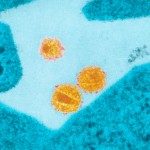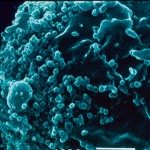Lien vers Pubmed [PMID] – 17928341
J. Virol. 2007 Dec;81(24):13904-15
Human immunodeficiency virus (HIV) controllers are rare individuals who spontaneously control HIV type 1 replication for 10 years or more in the absence of antiretroviral treatment. In the present study, HIV controllers (n = 11) maintained potent HIV-specific CD4 responses in spite of very low antigenic loads. Their CD4+ central memory T (T(CM)) cells were characterized by near-normal numbers and preserved interleukin-2 (IL-2) secretion in response to HIV antigens and uniformly high expression of the survival receptor IL-7 receptor alpha (IL-7Ralpha). Controllers expressed CCR7 at higher levels than uninfected controls, suggesting differences in T(CM)-cell homing patterns. CD4+ effector memory T (T(EM))-cell responses were polyfunctional in HIV controllers, while IL-2 secretion was lost in viremic patients. Cytokine production was three times higher in controllers than in treated patients with undetectable viral loads, suggesting an intrinsically more efficient response in the former group. The total CD4+ T(EM)-cell pool underwent immune activation in controllers, as indicated by increased HLA-DR expression, decreased IL-7Ralpha expression, a bias towards gamma interferon production upon polyclonal stimulation, and increased macrophage inflammatory protein 1beta secretion associated with chronic CCR5 down-regulation. Thus, HIV controllers showed a preserved CD4+ T(CM)-cell compartment and signs of potent functional activation in the CD4+ T(EM)-cell compartment. While controllers did not show the generalized immune activation pattern associated with disease progression, they had signs of immune activation restricted to the effector compartment. These findings suggest the induction of an efficient, nondetrimental type of immune activation in patients who spontaneously control HIV.

